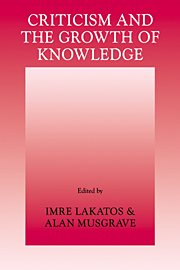 Criticism and the Growth of Knowledge
Criticism and the Growth of Knowledge Book contents
- Frontmatter
- Contents
- Preface
- Note on the Third Impression
- Logic of Discovery or Psychology of Research?
- Against ‘Normal Science’
- Does the Distinction between Normal and Revolutionary Science Hold Water?
- Normal Science, Scientific Revolutions and the History of Science
- Normal Science and its Dangers
- The Nature of a Paradigm
- Falsification and the Methodology of Scientific Research Programmes
- Consolations for the Specialist
- Reflections on my Critics
- Index
Normal Science and its Dangers
Published online by Cambridge University Press: 05 August 2014
- Frontmatter
- Contents
- Preface
- Note on the Third Impression
- Logic of Discovery or Psychology of Research?
- Against ‘Normal Science’
- Does the Distinction between Normal and Revolutionary Science Hold Water?
- Normal Science, Scientific Revolutions and the History of Science
- Normal Science and its Dangers
- The Nature of a Paradigm
- Falsification and the Methodology of Scientific Research Programmes
- Consolations for the Specialist
- Reflections on my Critics
- Index
Summary
Professor Kuhn's criticism of my views about science is the most interesting one I have so far come across. There are, admittedly, some points, more or less important, where he misunderstands me or misinterprets me. For example, Kuhn quotes with disapproval a passage from the beginning of the first chapter of my book, The Logic of Scientific Discovery. Now I should like to quote a passage overlooked by Kuhn, from the Preface to the First Edition. (In the first edition the passage stood immediately before the passage quoted by Kuhn; later I inserted the Preface to the English Edition between these two passages.) While the brief passage quoted by Kuhn may, out of context, sound as if I had been quite unaware of the fact, stressed by Kuhn, that scientists necessarily develop their ideas within a definite theoretical framework, its immediate predecessor of 1934 almost sounds like an anticipation of this central point of Kuhn's.
After two mottos taken from Schlick and from Kant, my book begins with the following words: ‘A scientist engaged in a piece of research, say in physics, can attack his problem straight away. He can go at once to the heart of the matter: that is, to the heart of an organized structure. For a structure of scientific doctrines is already in existence; and with it, a generally accepted problem-situation. This is why he may leave it to others to fit his contribution into the framework of scientific knowledge.’
Information
- Type
- Chapter
- Information
- Criticism and the Growth of KnowledgeProceedings of the International Colloquium in the Philosophy of Science, London, 1965, pp. 51 - 58Publisher: Cambridge University PressPrint publication year: 1970
Accessibility standard: Unknown
Why this information is here
This section outlines the accessibility features of this content - including support for screen readers, full keyboard navigation and high-contrast display options. This may not be relevant for you.Accessibility Information
- 328
- Cited by